Recently, the problem of the functioning of the Plato system has become incredibly relevant. I must say that this problem affects not only professional truckers, but also all residents of Russia as a whole. How does Plato work? What are the advantages and disadvantages of this system? Answers to these questions will be provided in the article.
Legal regulation
The Plato system works as an incredibly complex and intricate mechanism. This is a really difficult project, which should be regulated legally. There are a number of regulatory documents that are the legislative basis for the phenomenon under consideration. The first and most important document that would be worth mentioning here is FZ-68 from 2011. He makes some amendments to the Administrative Code of the Russian Federation. Here are the norms that are levers for collecting finance in the system. It is also worth highlighting the Russian Budget Code, which enshrines legally the following points:
- the sequence of a number of actions for crediting finance to the system;
- a number of requirements that govern the introduction of finance for the operation of heavy trucks on the roads (FZ-68 establishes a ban on driving multi-volume vehicles without paying a fee to the system);
- FZ-257 "On Roads for Transport" secures the integrity of the system.
The Federal Road Agency and the RoTech-Invest company have concluded an agreement to regulate the Platon system under consideration.
general information
Why was the system of control over truckers introduced in the Russian Federation introduced? Its creators speak immediately about several goals that they would like to achieve through the regulation of Plato. First of all, it is a struggle with broken roads. According to the assurances of the developers of the system, the roadways in the country are not in the best condition due to the frequent passage of heavy trucks. True, some experts adhere to a different point of view, claiming poor-quality and cheap road repair.
As evidence, experts point to foreign countries, where road surfaces for a long time remain in optimal condition even with frequent passage of multi-ton machines. In contrast, the creators of the system themselves refer to foreign experience. They talk about the existence of similar collection methods in many countries of the world, for example, in Germany or the USA.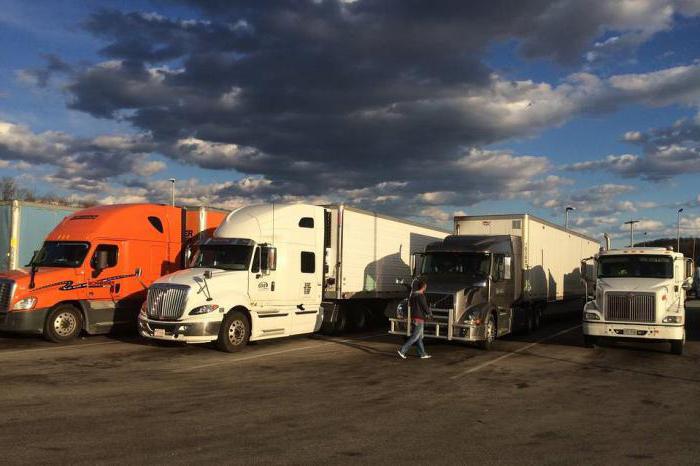
Finally, Plato has another goal. This is a fight with the so-called "gray" carriers - persons who do not comply with the standards for technical regulations, and, therefore, do not pay money to the corresponding system objects.
How does Plato work: principle of operation, object
What are the basic principles of the system? Laws adopted on this topic state compliance with the foundations of legality and justice, compliance with the Constitution and international standards. This also includes labor for the benefit of human rights and freedoms. However, a little more detail is worth telling about how the Plato system works. Everything is not so complicated here: drivers who want to travel on a federal roadbed are required to pay a certain amount of money. What is this for? According to the creators of the system, to realize the amount received for the restoration of roads whose condition is deteriorating due to the passage of heavy trucks. Part of the collected funds goes to the federal budget, after which they are sent to the appropriate authorities that are engaged in the restoration of the roadbed.
The first group of system elements
About how Plato works, we described above. Now you must find out that it consists of a number of the most important and interconnected elements, the high-quality functioning of which allows the whole system to work. Here are the components that are worth highlighting:
- A center for processing information from satellites, as well as instruments installed in vehicles. It is the authority in which all the data on registered cars that have paid or not paid tax is accumulated.
- Offices "Plato" mobile type. Such offices are designed to serve customers of the system. The states employ qualified IT specialists who are able to correctly and quickly enter data about a particular person into the program.
The rest of the elements will be described later.
The second group of system elements
Plato also functions thanks to the following types of elements:
- Devices on-board type. These are special motion readers for each driver. Devices check the number of kilometers paid by the trucker.
- Geo-surveillance systems. This includes satellites and special towers. How does Plato work with these systems? Everything is pretty simple here. This equipment allows you to track any vehicles online.
- Reading frames. These devices allow you to check with the driver for registration, payment for kilometers, a special route card, on-board computer, etc.
- Terminals "Plato". Thanks to such terminals, drivers are able to pay for the stages of their movement and engage in setting up route maps.

How does the Plato charging system work? All the above system components allow you to answer this simple question.
Machines Affected by Plato
As already mentioned, the system under consideration applies only to the operation of heavy trucks. According to regulations that answer the question of how the Plato works, vehicles of less than 12 tons are not covered by the system. Heavy loads fall under regulation, the weight of which exceeds the indicated figure, taking into account the driver and passengers. 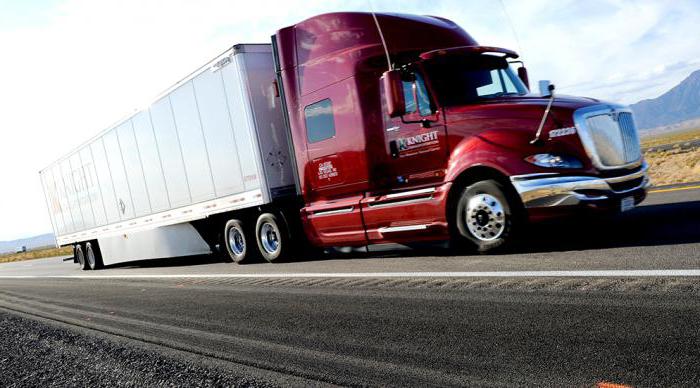 What cars should be allocated here? According to article 31.1 of FZ-257, this:
What cars should be allocated here? According to article 31.1 of FZ-257, this:
- army and military transport;
- special services vehicles: firefighters, police, ambulances, gas services, etc .;
- special vehicles for transporting people, with the exception of passenger-and-freight transport.
It is worth noting that initially the law concerned only truckers.
About spending funds in the system
The collection of funds entering the system is carried out by the Federal Road Agency. According to experts, the system should bring about 40 billion rubles annually. 90% of federal highways will be repaired by 2019. And all thanks to Plato.
It is worth noting that so far the system affects only federal roadways. The question of how "Plato" works on toll roads is not yet relevant in view of the lack of grounds. Truckers may prefer toll roads to federal. And then they will have to pay a smaller amount for fees. However, it will not be beneficial to everyone.
What should drivers do?
Persons operating multi-ton machines must, according to the law, register with the system in question. After that, they receive an individual bank account. Thanks to this account, truckers are able to pay for trips.  Payment can be made in two ways:
Payment can be made in two ways:
- using a route map;
- after installing a special device in the car, which would allow to track the movements, as a result of which the exact amount for the distance traveled would be obtained.
Processing the received data and their constant monitoring allows you to determine the exact amount of money that will go, as the creators of the system claim, to repair the roadbed.
About fees and penalties
It is worth moving, finally, to the most important and not the most pleasant for truckers themselves. It's about the amount of the fee. The Platon system in Russia works as a mechanism with one simple principle - to charge heavy truck drivers a little more than one and a half rubles for each kilometer traveled. According to experts, the amount will be indexed annually, which means it will increase. Is this a lot for drivers of multi-ton cars? 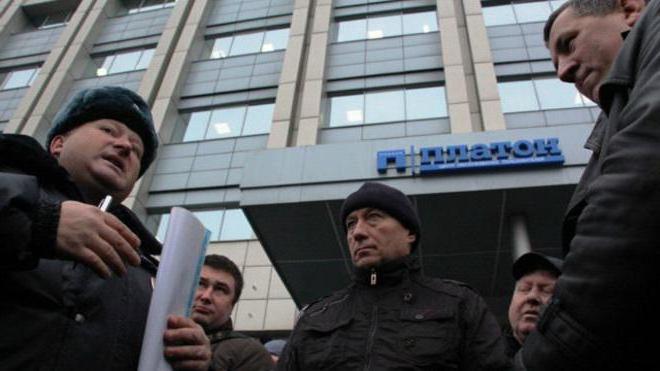 According to their own statements, very decently. Even before the adoption of the relevant law, a series of protests staged by truckers swept across the country. Grievances do not stop to this day. Drivers claim that most of their income has more than halved.
According to their own statements, very decently. Even before the adoption of the relevant law, a series of protests staged by truckers swept across the country. Grievances do not stop to this day. Drivers claim that most of their income has more than halved.
What responsibility will be placed on heavy truck drivers who choose to ignore payments? The law speaks of a fine of 5 thousand rubles for the first time and an amount of 10 thousand rubles for all subsequent facts of non-payment. This applies to both individuals and legal entities.
About the route map
The so-called transport (or route) map, which allows you to read the number of kilometers traveled, has already been mentioned above. According to the law, this is a special document containing a detailed and accurate route for the movement of heavy trucks. Drivers who do not have time or do not want to install an on-board computer in their car must navigate along the paper version of the route.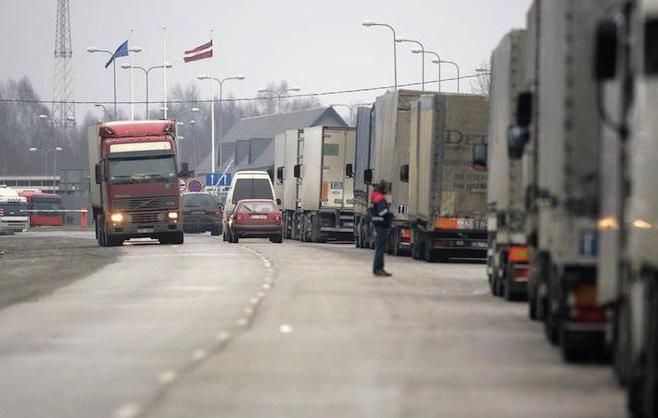
The map shows the registration number of the car, the dates of the start of movement, bindings to the federal type highway, the date and place of receipt of the document, as well as some other data are fixed.
Does the Plato system work for drivers who do not have a card or an on-board computer? The answer here is no. Moreover, drivers who do not wish to adopt the new rules will be liable.
The influence of the system on Russian society
Detailed material was provided above on how the Plato system works. Reviews and opinions about this system are no less interesting and relevant topic. This is what will be discussed later.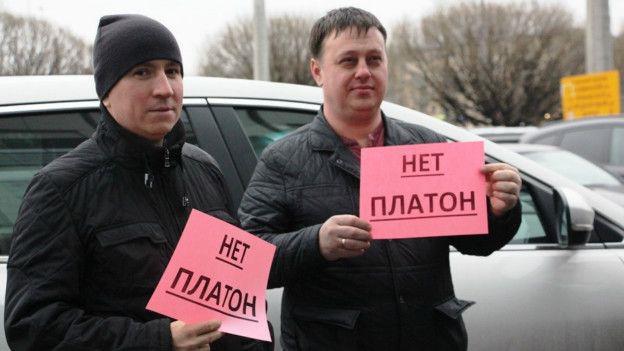
As already mentioned, "Plato" has a significant impact not only on truckers, slightly complicating their lives and professional activities, but also on the whole of Russian society. What is this influence? State authorities and representatives of the system in question talk about repairing roads and combating illegal traffic, but all these goals are by no means in the near future.
Many citizens see the opposite, more visible and real side of the project. This is a significant increase in prices for products in stores, the deterioration of the life of a considerable layer of the working class, namely truckers, financial fraud of the state with the developers of the project, etc.
A little more worth talking about the increase in food prices. Many experts made calculations and found that increased costs for transporting goods can slightly increase the price of products on the shelves. As soon as the law was passed, experts talked about a 1% increase. However, it is worth considering the fact that the amount of fees will constantly increase. So, after 2017, indexation will occur, as a result of which truckers will be required to pay much more than one and a half rubles per kilometer.